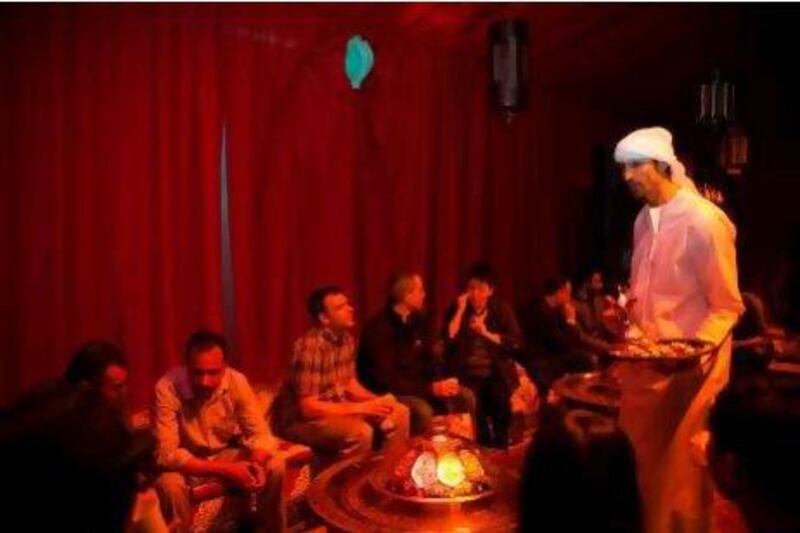NEW YORK CITY // As unsuspecting tourists crowded Times Square, munching hot dogs under colossal advertising screens and enjoying the spring breeze, the lights suddenly went out.
After a few seconds of disconcerting darkness the screens blinked back to life and a video began to play, featuring Abu Dhabi attractions including the Sheikh Zayed Grand Mosque, dunes, traditional Bedouin life and gliding dhows.
"Dude, I'm not gonna lie to you," said Mike Clinton, an aspiring actor waiting with his high-school class to see a play. "What is it?"
"I don't know," replied Tom Roth, a classmate standing next to him. "But it's awesome."
Minutes earlier, a man by an enormous white tent in front of Mike's class had explained over the loudspeaker that it was the launch of a four-day event to promote the opening of the Abu Dhabi Tourism and Culture Authority's US office in Manhattan's renowned Trump Tower.
The authority hopes to attract at least a portion of the 500,000 people from the US and abroad who amble through Times Square each day into its giant, majlis-style tent.
The purpose of the interactive display is to "awake your five senses", as a placard put it, to the pleasures of holidaying in Abu Dhabi.
There was evidence that the plan was working, as visitors who usually have only the square's advertisements to stare at jumped at the promise of genuine interaction, even if they didn't quite get it.
A queue wrapped all the way around the small block as the sun set.
"I've never heard of Abu Dhabi," said a confused Lee Gyugyeon, 23, a student from Seoul who waited with his friends to find out what it was all about. "I don't understand. What is this? A hotel? An advertisement?"
Inside, red velvet drapes, carpets and Bedouin sofas sat in dim lighting and wintery air conditioning.
The heady scent of sandalwood hung in the air, erasing all memory of New York's muggy odours outside.
American caterers in Emirati clothing served dates and coffee, held falcons, decorated hands with henna and offered samples of Middle East incense and essential oils.
"So, does anyone know where Abu Dhabi is?" asked a blond American in a white kandura and ghutra to a group of visitors, before they were guided through the five stations.
Some had, others did not answer, instead asking nervously about the chances of the hooded raptor on the falconer's arm attacking.
One man tempted fate and tapped one of the falcon's wings before snatching his hand back, laughing.
"I wanted to check this out," said Dave Wilson, a photographer from North Carolina. "I heard how lavish the tents could be."
His companion, Lanita Goins, was waiting for henna to be applied.
"This is introducing me to something I've never experienced before," Ms Goins said. "I'd heard of Abu Dhabi but never gave it much thought before this."
A group of Israeli-American university students had been reluctant to wait in line, but were later happy they had.
"I think it's great that they're doing this," said Ilena, 25, who only gave her first name. "There is a certain view the world has of Muslim countries and I think this shows something people aren't used to."
There were also those who were drawn into the tent because it reminded them of home.
"I feel good seeing the tent in the middle of Times Square," said Yazeed Al Shathry, a student from Riyadh.
Mansour Al Qaissieh, an Abu Dhabi native studying at New York University, stood alone watching a film about the emirate playing in the last stage of the tour.
"It's awesome, it's beautiful," Mr Al Qaissieh said, wistfully. "Home, sweet home."
But he and the other visitors from the Gulf had one complaint:
"The kandura. Who taught them?" he exclaimed, referring to the caterers' attempts at Khaleeji authenticity.
"They are definitely wearing pants underneath."
newsdesk@thenational.ae






